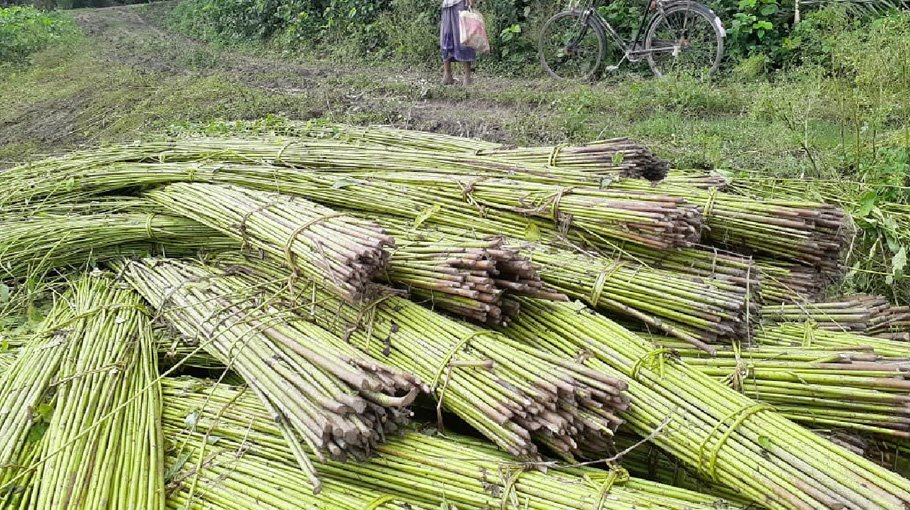Farmers of Jibannagar desperate for alternative source of water

Jute yield is good in Chuadanga's Jibannagar, but the farmers are disoriented due to lack of water. Jute fibers are drying on the ground in the hot sun. At this time, if there is no rain as required, the people concerned are afraid of massive loss of jute.
Even though the month of Shravan is half way through, the desired rain has not been received, causing frustration among the farmers. Most of the canals in the area are supposed to be full of water during the months of Asadha and Shravan, but this year they are still dry. Even if there is little water in some water bodies, it is not enough to decompose the jute.
It has been seen on the ground that many of the farmers have cut jute and piled it on the side of the land, some on the side of the road, next to the canal-bill or pond in the hope of rain. Some have covered the land with straw and garbage due to lack of water. Many of them are trying to decompose the jute with soil and heavy things in little water from canals and reservoirs.
Some people are giving water with a shallow engine to wake the jute in the pond or reservoir. Someone else is trying to wake up by taking a car to a reservoir far away.
According to Jibannagar Upazila Agriculture Office sources, the target of jute plantation in Jibannagar Upazila was set at 1,650 hectares in the current season. But the farmers have grown jute on 1 thousand 797 hectares of land more than the target. Due to good prices last year, farmers are more inclined towards jute cultivation this time.
Liakat Miah, a jute farmer of Dehati village of Jibannagar upazila, said that there is currently a problem in growing jute due to lack of water. We have to wake up with jute in the reservoir away from the field. Additional cost of labor and transportation has to be calculated. The cost of jute cultivation in one bigha land is about 13 thousand rupees. Average yield per bigha is 10 maunds. The current market price of jute is 2 thousand 500 to 2 thousand 700 taka. Selling jute at this price will make a profit.
Akimul Islam of Manoharpur village said that summer heat is going on in nature during the monsoon season. Due to lack of desired rain, jute is burning in the fields. I can't cut jute due to lack of water even though I have time. Many have cut the jute but could not wake it up due to lack of water and have piled it on the ground. Many farmers provide water through irrigation in ponds or small reservoirs, but they have to pay additional costs. Despite knowing the sure profit, the farmer's dream remains elusive due to nature's adverse behavior.
Jibannagar Upazila Agriculture Officer Sharmin Akhter said that the farmers have started cutting the jute of the land. Now the big problem is jute rotting. Due to lack of water, the farmers are not able to decompose jute properly. We recommend jute rotting by ribbon rating system at low cost to farmers.
By rotting jute in this way, the fiber quality of jute is better. If you can produce good quality jute, you can get good price. They will benefit from it. It is suggested to soak jute in running water and soak without soiling.
He also said that due to the favorable weather, jute cultivation has been good this year and the condition of jute is also good. Even if there is no rain, jute production will not be disrupted. But heavy rains would have been more beneficial for the farmers.



